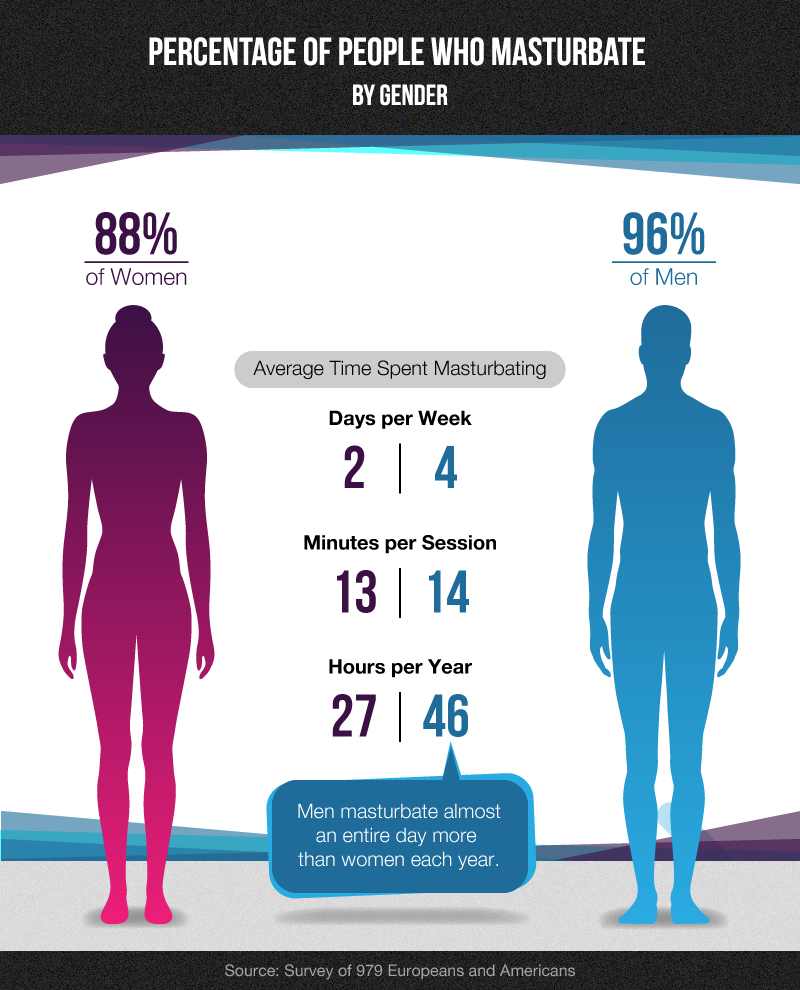How Much Should Men Masturbate
It can be challenging to determine what constitutes "normal" regarding male masturbation habits, as this topic is not often openly discussed. In this article, we will explore how often men typically masturbate and address frequently asked questions about male masturbation, sperm concerns, and the benefits of regular self-pleasure.

How Often Do Men Masturbate?
The frequency of male masturbation varies widely among individuals. Some men masturbate weekly, others do so daily, while others may only engage in this activity a few times a month or less frequently. All of these masturbation frequencies are considered within the normal range for men.
According to data from the National Survey of Sexual Health and Behavior collected in 2009 by FiveThirtyEight, here is a breakdown of how often men between the ages of 25 and 29 reported masturbating:
- 17% had not masturbated in the past year
- 15% masturbated a few times per year to monthly
- 25% masturbated a few times per month to weekly
- 23% masturbated 2 to 3 times per week
- 20% masturbated more than four times per week
Sex and relationship therapist Shadeen Francis, LMFT, explains that there is significant variation in masturbation frequency, which can fluctuate throughout our lives due to health, stress, schedule, desire, and partnerships.
How Often Should You Masturbate?
The frequency of masturbation is a personal preference, and there is no standard for how often one should engage in this activity. Masturbation is a common and low-risk habit that offers various health benefits. People should generally masturbate as often as it feels good for them.
A study conducted in 2016 found that men who ejaculate 21 times a month or more were significantly less likely to be diagnosed with prostate cancer than those who ejaculate four to seven times per month. However, it's important to note that this doesn't imply everyone must masturbate that often; it simply indicates that regular masturbation can be beneficial to overall health.
Can You Masturbate Too Much?
Most people do not need to worry about masturbating too much. However, as with any habit, including exercise and hand-washing, even healthy behaviors can become unhealthy if done in excess or extremes. The threshold for how much masturbation is too much varies from person to person.
If your masturbation habits are causing mental, emotional, relational, or physical distress, it may indicate that you are masturbating more than is currently healthy for you. Some signs that your current masturbation habits may not be serving you well, according to Shadeen Francis, include:
- Masturbation feels like a need instead of a choice.
- Masturbation no longer feels pleasurable and may cause pain, numbness, or a loss of pleasing sensations.
- Your masturbation habits interfere with having a satisfying sex life with partners.
- You struggle to keep up with your responsibilities or daily life because of the frequency of masturbation.
Ultimately, what constitutes "too much" masturbation depends on individual circumstances. If you are experiencing any negative effects from your masturbation habits, it may be beneficial to seek professional guidance.
What Happens If You Masturbate Every Day?
According to board-certified urologist Jamin Brahmbhatt, M.D., there are no known downsides or major side effects to daily masturbation. The same goes for daily ejaculation and daily sexual activity. However, it is important to consider how you masturbate.
One potential risk of frequent masturbation is tissue damage or skin irritation, particularly if vigorous stimulation is used without sufficient lubrication. Signs of this may include soreness, tenderness, swelling, or bruising. Additionally, becoming accustomed to a particular type of stimulation or stroke may lead to difficulties in maintaining an erection or reaching orgasm during partnered sex if it doesn't align with one's solo habits. To mitigate this, men can try diversifying their masturbation practices and incorporating solo play activities into partnered sex.
Can You Run Out of Sperm?
Frequent masturbation does not deplete your sperm reserve. Adult males produce new sperm daily, barring any medical complications. However, if you are trying to conceive, masturbation can temporarily affect the volume, count, and concentration of sperm in subsequent ejaculations. This occurs because your body may not have had enough time to replenish its sperm and fluid levels after recent ejaculations.
For individuals undergoing semen analysis, it is typically recommended to refrain from ejaculation for at least two days before the sample collection. Even if you have ejaculated multiple times a day, your ejaculate should still contain sperm, although the count may be lower.
Benefits of Masturbation
Masturbation offers numerous physical and mental health benefits, including:
- Stress relief
- Improved mood
- Increased energy
- Higher pain tolerance
- Reduced risk of prostate cancer
- Relief from period cramps
- Improved pelvic floor strength
- Enhanced sleep
- Improved libido
- The extended duration during subsequent partnered sex for individuals with penises
Benefits of Not Masturbating
Some individuals choose not to masturbate for personal, spiritual, or religious reasons. For them, not masturbating may provide benefits such as:
- Increased self-control
- Heightened self-awareness
- Improved sperm quality in subsequent ejaculations
- Easier orgasm attainment during partnered sex if ejaculation has been abstained from recently
- Potential increase in testosterone levels, according to some studies
Abstaining from masturbation can be part of semen retention, a spiritual, sexual practice where individuals avoid ejaculation due to the belief that semen retains "life force energy."
The Takeaway
Male masturbation habits vary widely among individuals, and what is considered "normal" encompasses a broad range of frequencies. In general, masturbation is a healthy and normal habit with minimal risks. However, if your masturbation habits cause any physical or emotional distress, it is advisable to seek professional guidance. Adjusting your masturbation frequency may be beneficial in certain situations, such as when trying to conceive or aiming to improve performance during partnered sex. Ultimately, engaging in masturbation as long as it feels good and doesn't negatively impact other aspects of your life will likely benefit you.